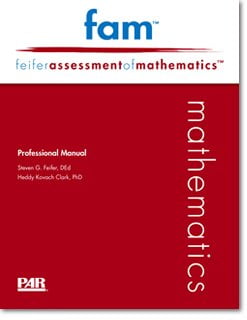
Feifer Assessment of Mathematics fam
Examines the underlying neurodevelopmental processes that support proficient math skills
Authors: Steven G. Feifer, DEd; Professional Manual by Steven G. Feifer, DEd, and Heddy Kovach Clark, PhD
Format: Paper and pencil, Online scoring via PARiConnect
Age: Preschool to High school
Time: 35 minutes for preschool age; 50 minutes for F - Year 2; 60 minutes for Year 3+; 15 minutes for Screening Form
Online Forms, Reports & e-Manuals
Click to browse products
Paper Forms & Handscoring Materials
Test forms, response booklets and scoring reference manuals.
Kits
Click to browse products
FAM Screening Form online Score Report (each) min order 5
FAM online Interpretive Report (each) min order 5
FAM online Score Report (each) min order 5
FAM Examinee Record Forms (10) Australian Adaptation
FAM Examiner Record Forms (10) Australian Adaptation
FAM Comprehensive Kit
The FAM is a comprehensive assessment of mathematics designed to examine the underlying neurodevelopmental processes that support the acquisition of proficient math skills. It is unique in that it helps you identify specific sub-types of dyscalculia to help inform intervention decision making.
Features and benefits
Comprises 19 individual sub-tests measuring various aspects of math fact retrieval, numeric and spatial memory, perceptual estimation skills, linguistic math concepts, and core number sense development.
Assists practitioners in not only determining the presence of a general math learning disability (MLD) but also in determining the specific sub-type of dyscalculia in order to better inform intervention decision making.
Can be used in conjunction with more traditional achievement tests (e.g., the AAB) that measure overall math performance.
Based on a neuropsychological paradigm, which dictates that multiple neural pathways underscore various cognitive processes used in mathematical problem solving.
A separate Screening Form, ideal for progress monitoring, permits you to screen for dyscalculia and MLD and to identify the needs of at-risk students. Learn more about the FAM Screening Form.
Test structure
Yields three index scores representing each dyscalculia sub-type (Verbal Index, Procedural Index, and Semantic Index) as well as a Total Index score that represents total test performance.
The Verbal Index score is a measure of automatic fact retrieval and the linguistic components of math.
The Procedural Index score is a measure of a student’s ability to count, order, and sequence numbers or mathematical procedures.
The Semantic Index score is a measure of visual—spatial and conceptual components, including magnitude representation, patterns and relationships, higher-level mathematical problem solving, and number sense.
Choose to administer the full battery, only the sub-tests associated with an individual index, or only individual sub-tests.
Reliable change and discrepancy scores can be calculated.
Students in Preschool take nine sub-tests, students in Kindergarten to Year 2 take 14 sub-tests, and students in Year 3 to High school take 18 sub-tests.
Technical information
Offers grade-based normative data (with age proxies provided); age and year equivalents and percentiles for sub-test scores; and confidence intervals, percentile ranks, z scores, and normal curve equivalents (NCEs) for index scores.
Sub-test and index scores are scaled to the familiar IQ metric (M = 100; SD = 15).
Standardised on a sample of 1,061 students in Preschool to High school drawn from more than 30 states and based on 2013 U.S. Census statistics.
The FAM Interpretive Report on PARiConnect is now available! This new report provides scores for all 19 sub-tests and includes detailed interpretations of index, index discrepancy, and sub-test scores along with targeted math interventions based on current research tailored to the student’s age and FAM scores. Contact us if you’d like to know more about PARiConnect account.



